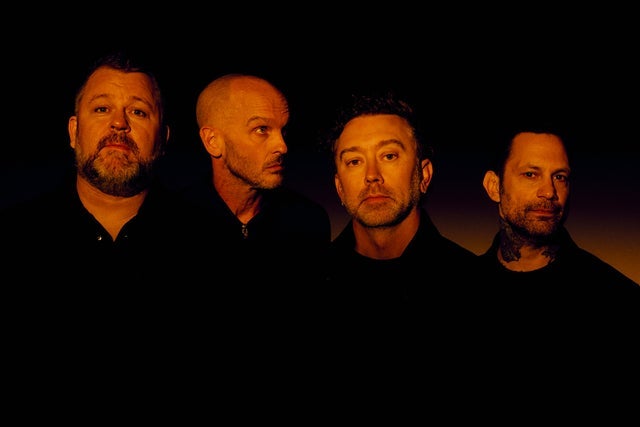The lies are inescapable. On every screen, the merchants of disinformation exert their cruel dominion. There is the queasy sense that we're drowning in a slipstream of screeching noise and mindless ephemera. The water is rising. The ground is shaking. The shadows are long and the lights are low. It's the perfect time for a new album from Rise Against.
Few bands have ever been as accurately named as the Chicago punk quartet. While fleeting styles and fashionable imitations have entered and exited vogue, Rise Against have remained a north star of artful resistance. While continuously updating their formula, they've sustained their original spirit of rebellion over a quarter century - amassing a body of work that doubles as a chronicle of our collective unraveling. Melodic hardcore detonations co-exist in perfect tension with dire warnings about the looming dystopia. And on their latest Loma Vista release, Ricochet, they've made what might be their most visceral, urgent, and high-stakes song cycle.
In the four years since Rise Against's last opus, the world has continued to be torn asunder by shameless falsehoods, brazen greed, and episodes of shocking cruelty. This devolution has not gone unnoticed by the band. Ricochet takes these crises under the scope and dissects them with lucid clarity, raw emotion, and global perspective. Amidst a period of nationalist aggression and isolationism, the album reflects on our own interconnectivity. A form of chaos theory in which our unruly actions and anger wreak havoc in ways that aren't always easily understood.
"We rely on each other, whether we like it or not," Rise Against lead singer, rhythm guitarist, and lyricist, Tim McIlrath says. "Everything that you do will affect somebody. We're connected to other countries and other economies; we're connected to undocumented immigrants. We're connected to every decision that our leaders make. We are not as isolated as we think. What we do, good or bad, creates one big ricochet effect."
The album's gestation started after the marathon tours for 2021's Nowhere Generation. In their trademark fashion, McIlrath and the band's other songwriter, bassist Joe Principe, reconvened to gather and compare notes. When the ideas began cohering, they entered the studio with lead guitarist Zach Blair and drummer Brandon Barnes, with the stated goal of relinquishing the notion of what a Rise Against song needed to sound like. Enlisting producer Catherine Marks (Boygenius, St. Vincent), they trusted her vision to expand upon their naturally colossal rippers. While mixing engineer Alan Moulder (Nine Inch Nails, Paramore, The Killers) added a sophisticated and atmospheric touch to the finished product.
You can hear the subtle shift most acutely on "I Want It All" and the album's title track. The former is an infectious headbang-ready riff that almost sounds like a long-lost '70s FM radio classic from the Kinks (if the Davies brothers had somehow been raised on Fugazi). While "Ricochet" opens with slinky drum machine claps that feint towards electro-clash before swiftly ascending into a sky-rattling Kevlar anthem that should make arenas consider paying a higher premium of roof insurance before booking the band.
On "Nod," the album's first single, Rise Against capture the emotional turbulence shrouding the current zeitgeist ("the line...drawn between dreams and nightmares is thin like a razor"). Rolling Stone rhapsodized that it's a "particularly potent rallying cry for the moment." Vice raved that it was the "anthem that we need now" - one featuring Rise Against at their best - "passionate, confident, and encouraging." The second salvo, "Prizefighter," is a propulsive burner that invokes a boxing metaphor to explore the connection between an artist and their fanbase. Balancing introspection with the incendiary, the song builds on the characteristic duality of the band's previous Platinum and Gold-certified classics.
It's this three-dimensional nuance that has allowed Rise Against to write some of the most important rock songs of their generation. On Ricochet, McIlrath's lyrics navigate many of the most pressing crises of the moment, offering unerring righteousness without sanctimony, and empathy without letting malefactors off the hook. They cover apocalyptic scenarios ("Black Crown") and false promises sold to the youth ("Gold Long Gone"), the necessity of resisting blind allegiance ("Soldier"), mental health ("Sink Like a Stone"), and the sensationalism of the algorithmic entertainment-industrial complex ("State of Emergency). Throughout it all, there is a cautious optimism for real lasting change.
"The fight for a better world almost always starts with an unpopular opinion or a minority of voices," McIlrath says. "When you feel overwhelmed, when it feels like it's you against the world, it's important to remember that every resistance movement started as a small and passionate group. Our songs may take you to a dark place, but there's always breadcrumbs of hope to help get you out of there."
Like the band's literary hero, George Orwell, they have absorbed the maxim that "in a time of deceit telling the truth is a revolutionary act." Ricochet is a success at simplest level: a collection of indelible rock and roll songs with infectious hooks that sound best played at eardrum-shattering volume. But it also functions as something more profound: a document of artists capturing the chaos of the moment, articulating complex truths with seismic power, and an awareness of the consequences that may befall us. This is an album built to be a part of the solution.
-Jeff Weiss


